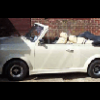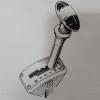Hello all, my first post here. I could not find a similar topic in the search so I try a new topic.
My car has SPi and automatic gearbox. The issue I'm facing is that when I start the car and then push the brake pedal the engine dies. I have tried a few things but those did not help to solve the issue.
(1) I replaced the four vacuum hoses as a previous owner had installed ordinary rubber hoses (which I didn't like). I discovered that the fuel trap was clogged, so I installed a new one. This did not solve the issue.
(2) The vacuum tube from the manifold to the brake servo looks very old and wasn't flexible at all. I replaced this, plus the inline non-return valve. This did not solve the issue.
Then I ran an experiment to see whether the brake servo is leaking: I disconnected the vacuum hose from the manifold to the brake servo. And temporarily plugged the connector at the manifold to avoid a vacuum leak here. The behavior was unchanged, so my conclusion is that it is not the brake servo that's causing this.
I now don't know what else I should check.
This is what I am observing: I start the car with the gearbox in P and the handbrake on, without pushing the brake pedal. The car revs normally (initially approx. 1000 rpm, after a couple of seconds approx. 850). I then push the foot brake and the engine stalls immediately. I tried to give it a bit throttle (e.g. 1,500 ~ 2,000 rpm) and then push the brake: the same happens, the engine stalls. Stalling is not limited to low (idle) rpm only.
I am not sure whether this problem is specific to SPi cars, or that other Mini's have it too. As a starter have I posted it in this SPi forum section.
Are there any suggestions out there? What could I investigate to find the cause of this problem?

















